COLLECTIVE LEADERSHIP FOR IMPACT
THE PROGRAM
Dec.
6-9, 2022 Oxford, United Kingdom
“
Leaders must reclaim the very thing our culture has so casually given away: Time to think together and learn from our experiences. Without question, this is the most critical act of leadership. It is how we restore sanity and possibility to our work within our sphere of influence. It is how we work with the dynamics of living systems and use our intelligence in lifepreserving ways as all other species do. ”
WHEATLEY, “LEADER TO LEADER”, 2017
MARGARET
Table of Contents
Welcome 2
The Program 3
DAY ONE | TUESDAY, DEC. 6
WELCOME & CONNECTION 3
DAY TWO | WEDNESDAY, DEC. 7
WHERE ARE WE NOW? FROM THEORY TO PRACTICE 4
DAY THREE| THURSDAY, DEC. 8 COLLECTIVE LEADERSHIP IN PRACTICE 4
DAY FOUR | FRIDAY, DEC. 9 APPLYING OUR LEARNING 4
Participants’ Bios 6
ATLANTIC FELLOWS FOR EQUITY IN BRAIN HEALTH 6
ATLANTIC FELLOWS FOR RACIAL EQUITY 8
ATLANTIC FELLOWS FOR SOCIAL EQUITY 10
ATLANTIC FELLOWS FOR HEALTH EQUITY US+GLOBAL 12
ATLANTIC FELLOWS FOR HEALTH EQUITY IN SOUTH AFRICA 13
ATLANTIC FELLOWS FOR SOCIAL AND ECONOMIC EQUITY 15
ATLANTIC FELLOWS FOR HEALTH EQUITY IN SOUTHEAST ASIA 16
THE ATLANTIC INSTITUTE 18
GUEST SPEAKERS 19
COLLECTIVE LEADERSHIP FOR IMPACT 1
Welcome
We welcome you to Oxford for the Collective Leadership for Impact thematic gathering. This is the first thematic convening to be held in Oxford since the start of the pandemic. As we begin to reconnect in person across the Atlantic community, this presents the perfect opportunity to explore what is possible when we come together to collectively lead for impact. We can’t wait to see how this week of thinking and learning together unfolds.
Our community’s vision and understanding of change is predicated on harnessing our collective power, voice and influence to address complex challenges and inequities. Our week together will give us the time and space to explore what that means in practice across a wide range of contexts, geographies and disciplines.
As leaders, we each have a crucial role to play in deepening our understanding and approaches, and come into this gathering with our own unique perspectives, experiences, ideas and knowledge about leading collectively for impact. With these rich assets in our pockets, and grounded in a spirit of reciprocity, we have the tools we need to spend this week together, exploring questions like: What does collective leadership look and feel like in practice? What approaches enable effective collective leadership for impact? How do we overcome the challenges of leading collectively in systems that value and normalize individual success, hierarchy and power over others? And in what practical ways can we harness our collective power to tackle the complex issues we seek to address?
With warm regards,
The Atlantic Institute team
2 ATLANTIC INSTITUTE
The Program
We hope you will enjoy an opportunity to connect and reconnect with Fellows from across the programs. This is an opportunity to exchange and pool knowledge about best practices, think about how to work across the community, and take time to restore our energies!
Objectives
■ Explore how collective leadership looks and feels in practice.
■ Consider different approaches to collective leadership.
■ Understand the capacity of a collective group of Fellows to catalyze change for impact.
■ Develop collective leadership skills, working across sectors, identities and borders
COLLECTIVE LEADERSHIP FOR IMPACT 3
Day One | Tuesday, Dec. 6 |
Welcome & Connection
10:00 Meet at the entrance to New College
10:00 – 11.30 “Uncomfortable Oxford” walking tour
12:00 – 13:15 Lunch
13:15 Meet at 3 Norham Gardens, Oxford
13:30 – 14.00 Framing: Why are we here?
14:00 – 16:00 Introducing ourselves
16:00 – 17:00 Welcome to Oxford
17:00 – 19:00 Welcome drinks & collective cooking
19.00 – 21.00 Home-cooked evening meal
Day Two | Wednesday, Dec. 7 | Where Are We Now? From Theory to Practice
09:30 – 10.15 Connection: check-in and framing
10:15 – 11:20 How do we understand collective leadership?
11:20 – 11:40 BREAK
11:40 – 13:30 Theory and frameworks
13:30 – 14:30 LUNCH
14:30 – 16:30 Collective leadership in practice
16.30 - 17.30 Closing round and reflections
19:00 – 21:30 Formal dinner
4 ATLANTIC INSTITUTE
Day Three | Thursday, Dec. 8 | Collective Leadership in Practice
09:30 – 10.15 Connection, check-in and framing
10:15 – 11:45 Our own stories of collective leadership
11:45 – 12:00 BREAK
12:00 – 13:30 Conversation circles
13:30 – 14:30 LUNCH
14:30 Open afternoon - Connecting with external partners or each other 18.00 Free evening
Day Four | Friday, Dec. 9 | Applying our Learning
09:30 – 10.15 Connection and reflections on previous afternoon
10:30 – 11:45 Conversation circles
11:45 – 12:00 BREAK
12:00 - 13.00 Connecting to our lived reality - Thinking Councils
13.00 - 14.00 LUNCH
14.00 - 15.30 Commitments and what next?
15.30 - 17.00 Closing reflections
19.00 Informal dinner (optional)
COLLECTIVE LEADERSHIP FOR IMPACT 5
Participants’ Biographies Atlantic Fellows
Atlantic Fellows for Equity in Brain Health
LAURA BOOI
Senior research fellow, Centre for Dementia Research, Leeds Beckett University, Leeds, United Kingdom. Originally from Vancouver Island, Canada (traditional territory of the Coast Salish Nations). Newcastle-upon-Tyne, United Kingdom
Laura is from Vancouver Island in Canada (traditional territory of the Coast Salish Nations) but she is now based in the United Kingdom. She is into laughing and brain health. She cares about making space in research for social justice issues related to the brain, and to include those voices who are systemically under-represented.
She is a senior research fellow at Leeds Beckett University’s Centre for Dementia Research as well as a Global Atlantic Fellow for Equity in Brain Health (2019). Her two specific areas of interest are promoting brain health in young adults and health-related cannabis research. She says that you are at all interested, she can’t wait to meet you and learn more about your work!
 MELISSA CHAN
MELISSA CHAN
Founder, Project We Forgot; consultant, CARA (Community, Assurance, Rewards, Acceptance), Dementia Singapore; president of World Young Leaders in Dementia (WYLD) Network Singapore
Melissa works with health and community care organizations to lead service design, innovation and growth projects across the dementia care journey. To reduce the scale and impact of dementia, they need to build collective conversations around brain health and co-create strategies to meet the long-term social, emotional and physical care needs of persons living with dementia, and carers. She uses design and development to provide intervention for persons with dementia and their carers. She has a keen interest in brain health, aging, dementia, and carer support — particularly in the intersection of research and translation into practice and in bringing evidence-based interventions to diverse populations. She is always looking to collaborate across sectors!
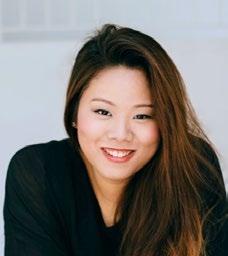
6 ATLANTIC INSTITUTE
RAFI HADAD
Attending physician, Stroke and Cognition Institute, Rambam Health Care Campus Haifa, Israel
Rafi Hadad is a neurologist specialist in cognitive neurology and movement disorders. He did his medical school training from the University of Messina, Italy. Rafi completed his residency in neurology at Rambam Health Care Campus, Haifa, Israel. Afterward, he joined the stroke and cognition clinic and movement disorders clinic at Rambam Health Care Campus as an attending physician and clinical fellow. Rafi has been involved in a large effort to promote a brain health registry in Israel, and an initiative to create a support system to help minority groups suffering from familial early onset Alzheimer’s disease.
Rafi is passionate about reducing social disparities and creating dementia diagnosis and testing methods for different cultures, especially for those in need who are of low socioeconomic status, for timely diagnoses and treatment. Connect with him if you’re also interested in cognitive neurology and brain health, cognitive assessment tools for diverse populations, post COVID-19 cognitive dysfunction, white matter hyper-intensity, vascular dementia, Parkinson disease and movement disorders, and LRRK2 mutation carriers.

FERNANDO PERES
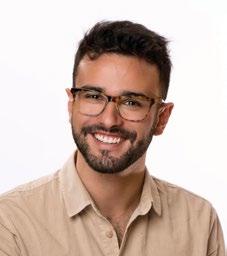
Writer and dementia advocate, Vovó Nilva; Coordinator of “agefriendly cities” protocols, International Longevity Center Brazil; director in Successful Aging and Dementias, Crônicos do Dia a Dia Porto Alegre, Brazil
Fernando is a journalist and writer, who is exploring positive ways to communicate dementia with empathy and compassion in different settings from books to social networks, to connect different generations. Fernando decided to dedicate himself to the care of his grandmother and best friend living with Alzheimer’s disease. Together, they ventured into social media to spread this unforgettable chapter in their lives by using positive approaches. He authored the book “Quem, eu?”, in which he shares part of this adventure. Fernando has also launched three children’s books addressing dementia, death and incurable diseases between Brazil, Argentina, Uruguay and Chile, highlighting the importance of including children in difficult conversations.
COLLECTIVE LEADERSHIP FOR IMPACT 7
Atlantic Fellows For Racial Equity
OBENEWA AMPONSAH
CEO, Obenewa Amponsah and Associates Johannesburg, South Africa
Obenewa is a certified coach, speaker and facilitator whose work specializes in leading courageous conversations, the ones that aren’t always easy but are necessary to move forward personally, professionally and as a society. Whether these conversations are in the form of one-on-one coaching, group trainings and workshops, or keynote addresses, she aims to create the optimal conditions for learning, collaboration and growth.
Her work is informed by 20 years of professional experience in Africa and North America where, in addition to other roles, she served as CEO of the Steve Biko Foundation and as an executive director of the Harvard University Center for African Studies. She has extensive experience in the private and development sectors. In 2019, she founded Obenewa Amponsah & Associates (OAA) that designs workshops and provides training. Its ethos is that collectively, individuals, teams, and communities can develop and achieve a vision that produces better outcomes for all. She is currently pursuing a doctorate in African Literature.
KIRAN KAUR BAINS
President and CEO, SA2020 San Antonio, TX, United States
Every ten years, a growing number of San Antonians co-create a shared vision made up of specific results and indicators by which to measure progress. Kiran led SA2020, an independent nonprofit that drives progress toward this shared community vision. She says a line in the community vision speaks directly to her understanding of collective leadership: “Our entire community takes responsibility for our collective well-being.”
She previously served as the first chief equity officer for the City of San Antonio, where she helped ensure that local government policies and services met the different histories and needs of San Antonians. Prior to joining local government, she worked in international development and peacebuilding in South Asia and East Africa.
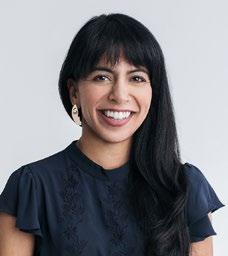
Her home town is San Antonio, and she is a proud first-generation college graduate. She has taught classes on leadership, power and dismantling anti-Black racism to young women of color in New York public high schools and aspiring teachers and school administrators at the University of Texas at San Antonio.
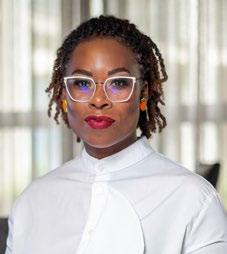
8 ATLANTIC INSTITUTE
BETSY HODGES

Adviser, Betsy Hodges LLC Washington D.C., United States
Betsy is building a framework, based on compassion, through which white people effectively work with one another on whiteness and racism, then scale up to have systemic impact.
WILNEIDA NEGRÓN
Strategic adviser, Ford Foundation Atlantic Institute Leader-in-Residence New York, NY, United States

Wilneida has based her whole career around exploring ways to align collectives of people in the advancement of economic justice across disciplines, lines of work, and sectors. During this time, she has developed and implemented collective leadership models in philanthropy, digital rights, racial equity, labor, immigration rights, news and media, technology and investing spaces.
As an Atlantic Fellow for Racial Equity, she carried out a collaborative project as one of eight Fellows. Together, they pooled their money to create a fund to launch an incubator to provide seed grants and technical assistance to Atlantic Fellows for Racial Equity projects that were supporting placed-based organizing around racial equity. She is currently in early stage development in a collaborative leadership project with Fellows across five Atlantic programs. The Atlantic Institute appointed Wilneida as one of the Leaders-in-Residence for 2022, with a focus on leadership.
COLLECTIVE LEADERSHIP FOR IMPACT 9
Atlantic Fellows for Social Equity
BOYD BROUGHTON
Director of Health, Te Rūnanga o Ngāti Whātua Tāmaki Makaurau / Auckland, Aotearoa New Zealand
Tēnā koutou, oti rā tēnā tātou katoa, greetings to you, greetings to us all! Boyd is Māori (Indigenous to Aotearoa New Zealand) from Te Tai Tokerau (The Northern lands) and Te Tai Rawhiti (The East Coast) of the North Island of Aotearoa New Zealand. He was recently appointed as the director of health for Te Rūnanga o Ngāti Whātua after a position as the manager of Te Hā Oranga, the health and social services arm of Te Rūnanga o Ngāti Whātua since 2018. Previously, he held several public health positions with Māori health providers, a public health unit, district health boards, non-government organizations, and enjoyed a secondment in the Ministry of Health/ Te Whatu Ora as part of the equity team during the COVID response of 2022.
As an Atlantic Fellow, his project focused on instaling an iwi (tribal) specific rongoā (healing) health system grounded in Ngāti Whātua mātauranga (Ngāti Whātua knowledge), pūrākau (Ngāti Whātua stories), hitori (history), utilizing Ngāti Whātua ancestral lands and resources. He says he is privileged to know that each fight we have today for equity is one less fight our mokopuna (grandchildren) must have tomorrow. He is a father of five and a stepfather of three (eight in total) Māori-speaking tamariki (children) and young adults.
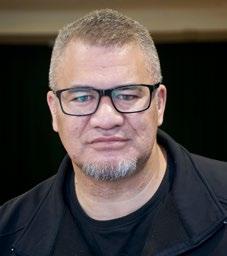
SAMMY HUGHES
Senior manager, Consulting Division, Ernst & Young; chair and founder, Nōna Te Ao Charitable Trust Te Tairāwhiti, Aotearoa New Zealand
Mālō e lelei and tēnā koutou katoa, from Sammy Hughes, who hails from the Kingdom of Tonga and the East Coast of Aotearoa, New Zealand. He works for Ernst & Young, looking after equity in education for the Oceania region. With an Indigenous collective mindset, where working as part of an ecosystem is fundamental, he works alongside businesses, governments, and organizations to find solutions to some of the key equity issues in the region.
He is the chair and founder of Nōna Te Ao Charitable Trust, which focuses on empowering rural Indigenous communities to understand the options available to them in regard to their pathways. They will have nearly 200 young people in their programs next year and are about to hire their first full-time staff member to look after the day-to-day work of the Trust.
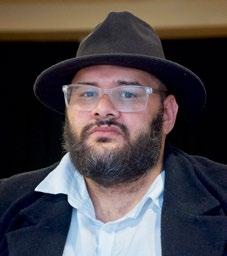
10 ATLANTIC INSTITUTE
ANGELA RUTTER
Strategic projects manager, Leadership Victoria; Co-Founder & Director, Common Cause Australia Melbourne, Victoria, Australia
Angela builds collaborations between Indigenous and non-Indigenous people in Victoria. She is engaged in civic leadership and engagement for social change where community, equity and nature is at the heart.
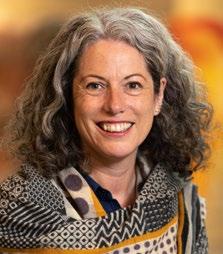
MICHELLE STEELE (CRAIGIE)
Assistant Secretary of the First Nations Aged Care Branch, Australian government department of health and aged care Moree, New South Wales, Australia
Michelle is a proud Kamilaroi/ Gomeroi woman from Moree, NSW, Australia. She is currently the assistant secretary of the First Nations Aged Care Branch at the Australian government department of health and aged care. Previously, she was the assistant secretary of the COVID-19 Indigenous and Remote Policy and Implementation Branch, leading the COVID-19 response and vaccination implementation for Aboriginal and Torres Strait Islander people and remote communities. She has been in the public sector for 19 years; one of her major roles is as chair of the First Nations Senior Executive Network. She had the privilege of representing Australia at the United Nations, building and connecting the global connections across First Nations communities. She is an inaugural Fellow of the Atlantic Fellows for Social Equity program, working on a project assisting women on their exit from prison. She holds an executive master’s degree in business administration (international leadership) and a bachelor’s degree in community management.
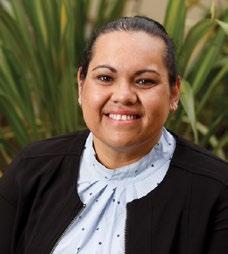
COLLECTIVE LEADERSHIP FOR IMPACT 11
Atlantic Fellows for Health Equity US + Global
RAZEL NIKKA HAO
Director, Disease Prevention and Control Bureau, Department of Health, Philippines Quezon City, Philippines
Razel Nikka Hao aims for equitable national resource allocation, comprehensive (non-vertical) disease prevention and control strategies, and the sustained engagement of a diverse government workforce that will enable responsive government decision- making. She leads policy and planning for COVID-19 and vaccination program policies, and health systems integration standards for disease prevention and control for universal healthcare.

IFEANYI M. NSOFOR
Director of Policy and Advocacy, Nigeria Health Watch; director, Behavioral Insights Lab; Senior Vice President for Africa, Human Health Education and Research Foundation Abuja, Nigeria
Dr. Ifeanyi M. Nsofor is a public health physician and global health thought leader. He is a leading voice on COVID-19, decolonization of global health, global health equity, global health security, universal health coverage, digital health and health research. Ifeanyi’s favorite mantra for collective leadership is an Igbo word “Igwèbụike” which means, “We are stronger when we work in unity.”
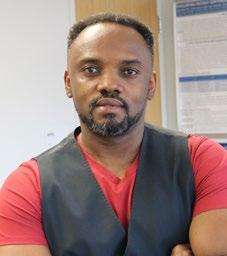
Since graduating as a medical doctor, he has worked in government, international non-profit organizations, indigenous non-profit health organizations and the private health sector. He was involved in launching two successful health start-ups (Nigeria Health Watch and EpiAFRIC). He served as CEO of EpiAFRIC and Director of Policy and Advocacy at Nigeria Health Watch. He has led more than 30 research projects across Sierra Leone, Liberia, Guinea, Ghana and Nigeria. In 2021, he led a national survey to unpack Nigeria’s epidemic preparedness prior to the COVID-19 pandemic, its response and plans for future preparedness for epidemics/ pandemics. In 2015, he was co-lead of evaluation of the African Union’s intervention to end the Ebola outbreak in Guinea, Liberia and Sierra Leone. Since 2017, Ifeanyi has led the conceptualization, coalition-building, fundraising and implementation of seven hackathons to develop digital health technologies across three countries (Kenya, Nigeria and South Africa).
He has authored and co-authored more than a hundred opinion pieces and is a frequent commentator and interviewee in high-quality media outlets and a TEDx speaker.
12 ATLANTIC INSTITUTE
MONALISA PADHEE
Program head of Women Wellness Initiative and Enriche Health, Barefoot College International, India Tiloniya, India
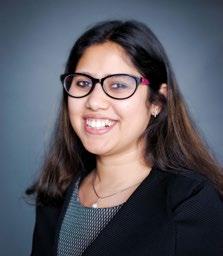
Dr. Monalisa Padhee is the program head of Women Wellness Initiative at Barefoot College International. In this role, she works on delivering healthcare interventions directed at disrupting the “intergenerational cycle of poor health” in rural girls and women. She and her team develop interactive curriculum on various women’s health topics, including menstrual and reproductive health and nutrition that transcends the barrier of literacy. Using a community-driven approach supported by digital tools, her efforts have enabled grassroots leaders to disseminate health information and provide basic health services. She is also passionate about creating entrepreneurial health solutions.
Monalisa writes opinion pieces and advocates for bringing people from grassroots movements to decision-making platforms. She is a Gender Lab Fellow at the Swedish Institute and is an alumna of Aspen New Voices Fellowship. She holds a doctoral degree in medical science from the University of South Australia.
Atlantic Fellows for Health Equity In South Africa
LEBO MOLETE
Founding member, Patient Health Education Liaison and Advocacy (PHELA) Foundation Johannesburg, South Africa
As a founding member of Patient Health Education Liaison and Advocacy (PHELA) Foundation, Lebo leads program development and policy advocacy interventions, facilitating the inclusion of patients as a prominent stakeholder group in the development and implementation of health services and strategic health policies. He is passionate about and committed to advocating for equitable public health outcomes.
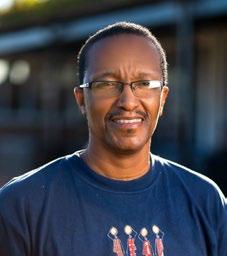
COLLECTIVE LEADERSHIP FOR IMPACT 13
KENTSE RADEBE
Innovation Director: Keep All Children on Track, DG Murray Trust Cape Town, South Africa
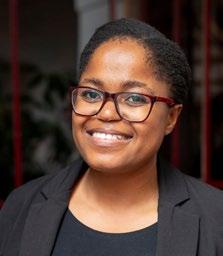
Kentse is the innovation director of Keep All Children on Track at DG Murray Trust, providing strategic leadership to keep all children on track by Grade 4 — to unlock human potential and build an inclusive and transformed society. Her work includes supporting grant-making that is innovative, inclusive and grounded in civil society, and managing key stakeholder relationships. She works with partners, civil society organizations, government departments and officials, and donors. Previously, Kentse led the systems innovation portfolio at the Bertha Centre for Social Innovation & Entrepreneurship at the Graduate School of Business at UCT. Her interest is looking into how organizations can reduce social stratification and advance equity and social justice. In 2020, she was part of the Community Action Network (CANs) that emerged as a response to the pandemic and shared resources to secure the well-being of their communities, particularly in contexts where the government was nonresponsive and not agile. This sparked Kentse’s interest in the principles of collective leadership. Kentse is also a member of the Wellcome Trust Ideas Hub, focusing on mental health, as well as being a Fulbright Scholar, a Mail & Guardian 2019 Young 200 award- recipient, and an Allan Gray Orbis Foundation Fellow.
ANELE SIGCAU
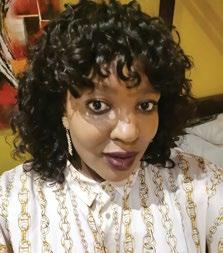
Pharmacist, Department of Health, South Africa East London, South Africa
Anele is a pharmacist who has worked extensively with non-governmental organizations such as Khethimpilo (meaning “choose health”). She supports facilities in coming up with innovative ways to ensure patients have access to medication and other items: e.g., contraceptives for young women, vaccines for children, and chronic medication which should always be available to ensure adherence. After many years of being a support partner to the government, through working for an NGO, she settled into a small rural town where she manages the community health center pharmacy and supports nine clinic dispensaries. She also uses digital storytelling to showcase current issues in rural communities, allowing the community to raise issues in their own words and propose solutions because people know their communities best. She has directed a documentary featuring a community that called out three human rights issues for which they would like governmental assistance. This led to her partnering up with another Atlantic Fellow for Health Equity in South Africa to work on an intervention for the community, which includes various stakeholders.
14 ATLANTIC INSTITUTE
Atlantic Fellows for Social and Economic Equity
MOHAMMED-ANWAR SADAT ADAM
Programs and Policy Influencing Lead at Oxfam in Ghana Accra, Ghana
Mohammed-Anwar Sadat Adam is an interdisciplinary development professional with 15 years of experience in strategy and program leadership; in organizational development for civil society and local government; in gender, governance and social accountability; in development evaluation; and in policy research and analysis for advocacy and policy influencing and reform processes in Ghana and beyond.
Recently, he co-authored publications on civil society sustainability in Ghana and contributed to the Oxfam report “Building a More Equal Ghana”. He is currently programs and policy influencing lead at Oxfam. From 2018 to 2022, he served as head of Programs and Campaigns at Oxfam in Ghana. He managed a team of thematic advisers and managers leading the delivery of key thematic programs of Oxfam in Ghana’s advocacy and campaigns work at national level, which complemented influencing, advocacy and campaigns at regional, continental and global level. Mohammed-Anwar has also served as a faculty member of the Graduate Institute of Geneva and teaches strategic project management on international development policies and practices in Ghana.
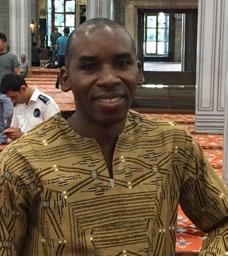
KITTI BARACSI
Learning coordinator, TuTela Learning Network; Learning and Research Consultant Lisbon, Portugal
Kitti creates spaces of collective learning and creative action to fight urban inequalities with children, young people and women. She connects experiences of grassroots activism to spread existing but marginalized models of change.
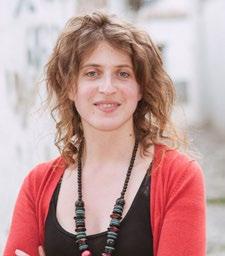
COLLECTIVE LEADERSHIP FOR IMPACT 15
Atlantic Fellows for Health Equity in Southeast Asia
 ABDEL JAMAL DISANGCOPAN
ABDEL JAMAL DISANGCOPAN
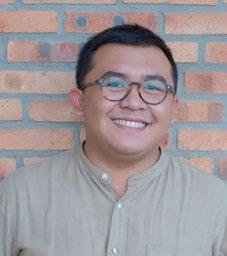
Law Attorney, law reform specialist and law lecturer, University of the Philippines Law Center Quezon City, Philippines
Abdel is an attorney currently teaching law and serving as a law reform specialist at the University of the Philippines Law Center, the premier legal policy center in the Philippines. He is passionate about public health, and human rights with focus on collective and minority rights, and he has a growing interest in the emerging field of business and human rights. He has experience in international humanitarian law; and in the promotion and protection of human rights, which began when he worked in the Autonomous Region in Muslim Mindanao (ARMM) in the Philippines. He served as coordinator of legal issues for the Office of the Presidential Adviser on the Peace Process as part of the government peace negotiating panel for talks with the Moro Islamic Liberation Front, humanitarian affairs assistant with the United Nations Office for the Coordination of Humanitarian Affairs for Tropical Storm Sendong, head of the provincial office in Marawi City for the Regional Human Rights Commission in the ARMM, and as technical assistant for Supertyphoon Yolanda Recovery for the World Health Organization Philippines.
DWI MARTHA
Programme Management Officer/deputy head of UN Youth Strategy (Youth2030) Secretariat, Office of the UN Secretary-General’s Envoy on Youth New York, NY, United States
Angga Dwi Martha is a deputy head of the UN Youth Strategy Secretariat/ programme management officer at the Office of the Secretary-General’s Envoy on Youth in New York. He has more than ten years of experience in youth policy and sustainable development diplomacy. He has a strong interest in ethical youth leadership; how young people can play an important role in championing innovation and help the country progress toward achieving democracy and social justice. He was part of the inaugural batch of the Obama Leaders: Asia-Pacific by the Obama Foundation and was also awarded as part of the British Council’s Future Leaders Connect in 2018.
ANGGA
16 ATLANTIC INSTITUTE
Previously, he served as social policy specialist at UNICEF Indonesia (2018- 2021) where he managed the national portfolio on urbanization for children, adolescents and young people’s participation, Sustainable Development Goals (SDGs) advocacy, and coordinated UNICEF’s support to the Indonesian G20 Presidency. As former UN youth adviser on SDGs in Indonesia, he helped coordinate and mobilize youth around awareness and the implementation of the 2030 agenda.
FRANSISKA SUGI
Researcher and founder of Yayasan Sejuta Harapan (Hands of Hope); field officer, Climate Resilience and Inclusive Cities Kupang, Indonesia
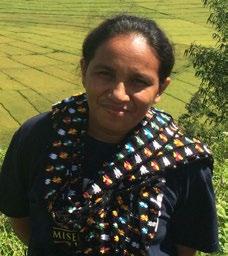
Fransiska works to empower community, particularly women and children, through education. She is the founder of Yayasan Sejuta Harapan (Hands of Hope), a local non-governmental organization working to help poor and marginalized people in East Nusa Tenggara get better access to education and health services. She is passionate about working at the intersection of research, development and policy. Her research has focused on the impacts of climate change on food security, water, and gender and social inclusion, and she has drawn on her public-sector experience to make strategic alliances with the government in order to scale up evidence-based actions in water, food security, and livelihood sectors.
Her efforts to build the technical capacity of local institutions span rural communities in 44 villages and have helped reduce risk to lives and livelihoods and increase the resilience of communities to all climate-related hazards. Through her leadership of Hands of Hope, Fransiska demonstrates her belief that grassroots movements’ work — in the spirit of giving back to society and working within communities — can bring both empathy and expertise to help vulnerable people improve their lives. She hopes to become an agent of change in her province in ways that will eliminate poverty and improve the quality of lives of marginalized women and children.
COLLECTIVE LEADERSHIP FOR IMPACT 17
The Atlantic Institute Team
YAN CHEN
Program and impact lead - Innovation and Special Projects yan.chen@atlanticfellows.org
Yan Chen supports the work of Global Atlantic Fellows and Atlantic program staff through co-organizing spaces, events and gatherings that foster knowledge exchange, experience sharing, connectivity and collaboration in the Atlantic community.

AMANDA ODUKA

Program and impact lead - Grants amanda.oduka@atlanticfellows.org

Amanda’s role is to design and deliver an exceptional, non-precedent setting fund for Global Atlantic Fellows’ collaborative projects, with responsibilities including the design of the fund’s objectives, and application and review processes.
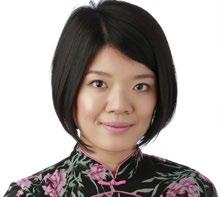
KIM OOI
Team coordinator (Grants and Funding) kim.ooi@atlanticfellows.org
Kim provides high-quality support as coordinator for grants and funding in support of the work of Global Atlantic Fellows and program staff. She has many years of experience in higher education and previously helped promote and manage University of Oxford scholarships.

SHANJITHA RAJASINGAM
Team coordinator (Convenings) shanjitha.rajasingam@atlanticfellows.org
Shanjitha provides support for convenings and programs in support of the work of Global Atlantic Fellows and Atlantic program staff.
JEMMA STRINGER
Program and impact lead - Innovation and Special Projects jemma.stringer@atlanticfellows.org
Jemma designs and facilitates programs to support Global Atlantic Fellows and program staff, underpinned by critical and inclusive pedagogy, and supports an enabling environment for a strongly connected lifelong community of action.
18 ATLANTIC INSTITUTE
Guest Speakers
HASSAN SABRIE
Co-founder and co-director of Oxford Community Action
Hassan Sabrie is the co-founder and co-director of Oxford Community Action, a dynamic grassroots multi-ethnic community development organization whose activities include providing emergency food parcels to over 500 families in Oxford every Wednesday. In response to the COVID-19 pandemic, Oxford Community Action has worked collaboratively with Healthwatch Oxfordshire to translate local and national government COVID-19 information into six community languages. With Oxford Community Action, Hassan has helped lead and support Oxford’s New and Emerging Communities Wellbeing Research Project, developed in partnership with Healthwatch Oxfordshire. He also co-founded OCA Kitchen, a social enterprise that creates great food and raises money for good, amongst many other activities.
In 2019, Hassan was part of the organizing team for Oxford Eid Extravaganza which, with its key theme of ‘Protecting the Environment’ as part of Oxford Green Week, attracted over 10,000 visitors. Between 2019 and 2020, Hassan contributed knowledge and expertise on engaging with diverse multi-ethnic diasporas as part of the advisory group for the Oxford Citizens Assembly on Climate Change. He played a lead role in coordinating the 2018 Men’s Health Research Project, which was awarded the NHS England Award for Promoting Community Health. A short film about the research project went global when it was chosen for the prestigious APHA (American Public Health Association) Global Public Health Film Festival 2019, in Philadelphia.
As co-founder and co-director of the Diversity Football League, Hassan has achieved national recognition with media coverage. The League won the English Football Association award 2020 for Grassroots Project of the Year. As head coach of the multi-ethnic community-based grassroots football team in East Oxford United, Hassan organised Oxford’s first ever Refugee and Asylum Seeker Football Cup Tournament in 2017, which continued into 2018 and 2019.
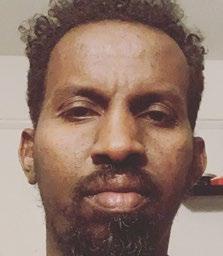
COLLECTIVE LEADERSHIP FOR IMPACT 19
DR. INES SMYTH

Academic and development practitioner, feminist and activist Dr. Ines Smyth has been an academic and a development practitioner focusing on gender equality and women’s rights for many years. She is currently a consultant, still committed to addressing these concerns and working for a number of international organizations. She is a feminist and an activist. She has been actively engaged with Extinction Rebellion (XR) in the United Kingdom, both nationally and locally. XR is an international movement that uses non-violent civil disobedience in an attempt to halt mass extinction and minimize the risk of social collapse. The realization of the urgency and scale of the climate crisis and of the connections between this and social, racial and gender injustice, has made this engagement both inevitable and a source of hope.
In her forthcoming publication, “ActionAid Myanmar Training Manual: Women’s Rights and Transformative Feminist Leadership”, co-authored with E. Brown, she writes: “Transformative Feminist Leadership describes a collaborative approach to leadership for women’s rights — which is clear about the deeper, systemic changes we want to achieve.”
20 ATLANTIC INSTITUTE
DR. EDWARD BROOKS
Research director, Virtues and Vocations Project, Oxford Character Project
Dr. Edward Brooks’ research is currently focused on virtue ethics, hope and character and leadership development. Particular interests include the relationship between character and culture in commercial organizations, leadership for human flourishing, exemplarist moral theory, and character and leadership development in universities and businesses. He leads a major (£2.6 million) interdisciplinary research project, funded by the John Templeton Foundation, on culture, character and leadership, focusing on the sectors of technology, finance, law and business, and he is involved in several other collaborative projects. He is part of a working group at Harvard University’s T. H. Chan School of Public Health seeking to develop new measures for hope and optimism. He is working with the Human Flourishing Program at Harvard University to develop a new paradigm of leadership for human flourishing, is co-investigator of a project at the University of Northampton on “The Role of Exemplar Narratives in Cultivating Character”, and is a visiting lecturer in the department for education and social justice in the School of Education at the University of Birmingham. He also leads the development of a framework for character and flourishing in higher education in consultation with senior academics and administrators from 11 U.K. and international universities. He founded and directs the Oxford Global Leadership Initiative and Global Leadership Challenge and has developed and delivered character and leadership development programs for universities and commercial organizations around the world.
He is currently working on a book on the virtue of hope and an edited volume on “The Arts of Leading: Perspectives from the Humanities and Liberal Arts”. He holds a bachelor’s degree in modern history from Magdalen College, Oxford, and a doctorate in theology from Oriel College, Oxford.

COLLECTIVE LEADERSHIP FOR IMPACT 21
PROFESSOR CHELLIE SPILLER
Professor of leadership, Waikato Management School; and Atlantic Institute Leader-in_Residence
Chellie Spiller is a professor at the University of Waikato Management School, New Zealand. She has extensive corporate experience in tourism, management and marketing, holding senior executive positions in New Zealand and abroad, and brings this experience to her academic work and leadership and management development programs. Her research explores wayfinding, authentic leadership and how businesses can create sustainable wealth and well-being. Chellie is a 2022 Leader-in-Residence appointed by the Atlantic Institute; and an International Leadership Association Fellow. She was a Fulbright Senior Scholar at the Harvard Kennedy School and the University of Arizona, a recipient of a Research Excellence Award, Dame Mira Szászy Māori Alumni Award, National Māori and Academic Excellence Award.
Chellie is a co-author of a book on traditional Polynesian navigation, “Wayfinding Leadership: Groundbreaking Wisdom for Developing Leaders” (2015) with Hoturoa Barclay-Kerr and John Panoho. “Wayfinding Leadership”, now in its third print run, was shortlisted for the Māori Book of the Year awards, 2016; and is included in the list of 150 books by leading Māori authors assembled by the Royal Society of New Zealand to celebrate 150 years of Māori non-fiction publications.
Chellie’s latest book is “Practical Wisdom, Leadership and Culture: Indigenous, Asian and Middle-Eastern Perspectives”, co-edited with Ali Intezari and Shih-Ying Yang. Its stories from contributors around the world are illuminating and inspiring. She is a facilitator who works with a variety of organizations such as Air New Zealand’s middle management training, Global Women’s Breakthrough Leadership course, SPARK senior leadership and frontline teams, Harvard Kennedy School ASH Centre, the judiciary, the health sector, professional sports teams and district health boards and communities.

22 ATLANTIC INSTITUTE
GLOBAL COMMUNITY 2016–2022 23 N OTES
24 ATLANTIC INSTITUTE N OTES
Rhodes House South Parks Road Oxford OX1 3RG United Kingdom Email atlantic.institute@atlanticfellows.org Web atlanticfellows.org Social @atlanticfellows @atlanticfellows
@atlanticfellows

 MELISSA CHAN
MELISSA CHAN



















 ABDEL JAMAL DISANGCOPAN
ABDEL JAMAL DISANGCOPAN










